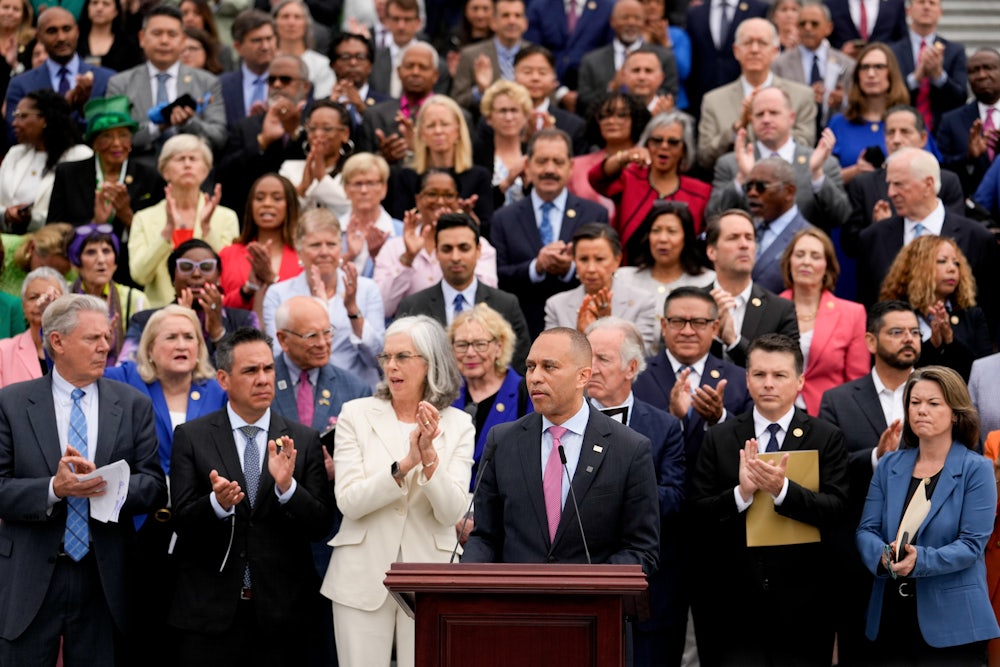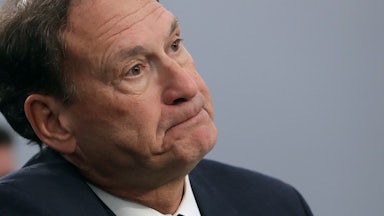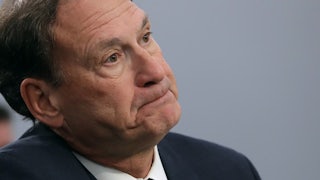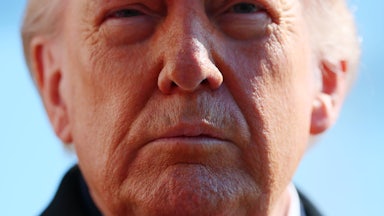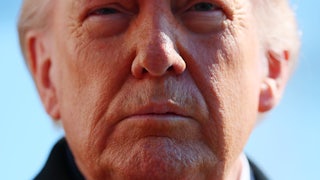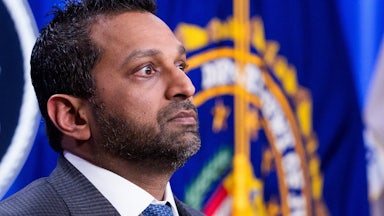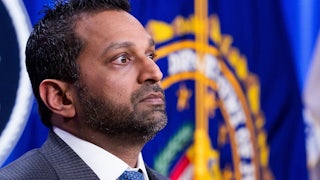The stark consequences of President Donald Trump’s unpopular signature budget bill—including the millions set to lose healthcare, access to food, or both, as well as the slashing of funds and subsidies for clean energy improvements—are becoming clearer, and more worrisome, in the days since its passage. National Democrats are now scrambling to respond, with an eye toward an August soft-launch of their next campaign.
There is a sense that the opportunity to lay some groundwork was distressingly missed. Some polling indicates that the public wasn’t as well-informed as it could have been about the contents of the bill and its real-world consequences before it narrowly passed both the Senate and the House last week. According to one poll by the Kaiser Family Foundation, around half of respondents did not know the effect the bill would have on Medicaid, Medicare, or SNAP food assistance payments. But national Democrats plan to stake their claim for the 2026 midterms on the very real harms that these new policies will cause, according to a July 3 article in Politico. As with the Dobbs decision that ended the federal right to abortion, Democrats once again find themselves reacting to Republicans’ boldly undertaken, but disastrous policies.
Whatever alternative they plan to offer remains on the drawing board. But money is heading out the door, all the same. As Politico goes on to report, Democratic PACs and affiliated institutions have started ramping up their ad buys in red districts, focusing on making clear to voters how much the spending and tax cuts affect their day-to-day lives and recruiting candidates to try and flip Republican seats. But these chess pieces didn’t start moving until after Trump’s bill was passed. Some Democratic strategists rue the fact that the party held their fire until now.
“I’m a little discouraged that, as far as being a really crafty, swift opposition—even though ultimately, we probably couldn’t have prevented [the bill from passing]—we certainly could have made it harder to pass and increased awareness that it is a bad bill,” Philip de Vellis, a partner at Democratic media strategy firm Beacon Media said. The bill is unpopular, but not necessarily because Democrats effectively communicated what it would mean for voters. “It’s built up any resistance because it truly is not good legislation.”
The bill is set to increase work requirements for access to Medicaid and to SNAP, which will make millions ineligible for healthcare and strip more than 200,000 people of food assistance. It will also likely affect service delivery for rural hospitals that rely on Medicaid payments; around 300 are already at risk of closure. Medicare access will be restricted for many people with disabilities, as well as immigrants with legal status. However, the bill also pushes defense spending close to $1 trillion for the first time ever, and ICE will get an additional $75 billion on top of the $170 billion already set aside for border enforcement. The legislation also provides for tax breaks totalling $1 trillion to the nation’s wealthiest.
Naturally, it would have been difficult if not impossible for congressional Democrats to have halted the bill in its tracks; Republicans hold a slim majority in both houses of Congress. Their chances of doing so, however, might have been greater had three Democratic lawmakers not died in office this session. Democratic Reps. Gerry Connelly, Raúl Grijalva, and Sylvester Turner, all in their 70s, passed away this year, increasing Republicans’ majority from five to eight seats. In the end, the presence of three additional Democrats might have only decreased the GOP’s winning margin to a single vote (the bill passed 218-214, with all Democrats and two Republicans voting against the measure)—but the additional agita a tighter margin might have put on House Republican leadership might have been a useful catalyst for additional public pressure.
“Part of the cruel truth about what just happened is that we’ve had, unfortunately and sadly, three Democrats pass away in office since November of last year,” Julian Mulvey, a Democratic media strategist and founder of Fight Agency said. “We need to start asking ourselves whether the Democratic Party should carry on like this, or is it time for people who have done incredible work over decades to start stepping aside and let new voices come forward who are able to communicate and get the message out?”
Democrats also need to be cognizant of what works in what contexts; following the 2022 decision to overturn Roe v. Wade, abortion rights ballot measures were fairly effective in red states. But protecting the right to abortion—though it is an economic, civil rights, and human rights issue—didn’t work as an issue on which to hang former Vice President Kamala Harris’ presidential campaign.
Some democratic strategists have some pretty strong opinions about what works. As Semafor’s Max Tani reported on Monday, a memo from Van Ness Creative Strategies “issued a strong warning about the party’s communication strategy, saying that Democrats in key 2026 battleground districts are ‘failing’ to reach Americans online.” The memo made particular hay about the Democrats’ inability to “adapt to the current social media landscape,” highlighting the way a “significant” number of Democrats up for re-election in 2026 had “left their personal and campaign social media accounts dormant.”
“Electeds, candidates, and organizations must take social media seriously,” wrote the firm. “If you do not feel like you can handle communicating directly with voters or constituents … now is a great time to retire.”
There is a growing sense among Democrats that it’s not sufficient to try to defend or reclaim the ground lost to the GOP—that the party needs to have a proactive disposition as well. In one such effort to create an alternative to the Republican agenda, national Democrats are devising Project 2029—which, in its nascent stages, appears to be just a title and a brain trust of establishment Democrats without a clear platform. It’s also a little reactive, seeing as how it’s a direct reference to the Heritage Foundation’s Project 2025, the draconian policy agenda that Republicans are enacting now that they control all the levers of power. As of now, it’s a superficial response reminiscent of Senate Minority Leader Chuck Schumer’s announcement that he would remove the OBBBA’s title from the legislation.
But even if the project does concoct a compelling platform, that’s only part of the game. Some Democratic strategists believe that new ideas require fresh faces to serve up the party’s challenges to both Trumpism and a broken status quo in a relatable and compelling way.
“The good news is that, especially on bread-and-butter issues, the public is on the Democrats’ side. But the messenger is equally as important as the message, and too often, our messengers are emblematic of the reasons voters haven’t been satisfied with what we’re putting forward,” Democratic strategist Anjan Mukherjee said. “Change rarely comes from the top, and voters made it clear in 2024 that they want change. It would behoove us to listen to them.”
In recent years, some of the most persuasive arguments Democrats have made have centered on the consequences of Trumpian misrule, with the public desire for normalcy after the early devastation of the Covid-19 pandemic driving President Joe Biden to his party’s nomination and his eventual ascension to the presidency. But the 2024 election demonstrated that the public’s memory is distressingly short—and that informing the public of the devastating impact of Republican policies is a task that demands constant vigilance and effort. With Trump’s budget bill, Democrats will have the chance to tell a new story about Trump’s destructive ideas. But it’s too bad that this work is only beginning now that millions of Americans are set to pay a terrible price.
